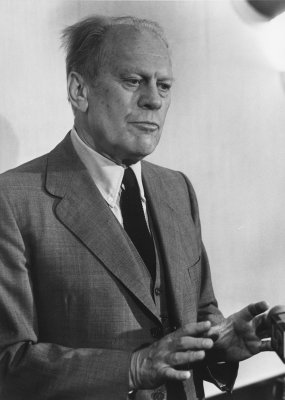Ed Karrens: Just two days after the suicidal attack on U.S. Marines in Beirut, American servicemen found themselves involved in the military action not in the turbulent Middle East, but on the small Caribbean island of Grenada. The first word that a military operation was underway came over Radio Free Grenada, which interspersed programs of reggae music with frantic announcements that the island was being invaded …
Unknown Speaker: "United States paratroopers have invaded Grenada with helicopter gunship. Our armed forces have engaging them in fierce battle. All Grenadians, report immediately to our respective militia bases. All doctors, nurses and medics, report to the hospital immediately. The Grenadian people are asked to block all roads and obstruct the enemy's progress. United States paratroopers have invaded Grenada with helicopter gunships."
"(Music.)"
Ed Karrens: Grenada had been a source of concern to the Reagan Administration for some time. Under the leadership of Prime Minister Maurice Bishop, who came to power in a coup in 1979, the island's Government had made a decided turn to the left. Just eight months after taking over, Bishop announced that Cuba would help Grenada build a new airport with a 10,000-foot runway. He said it would be able to accommodate large jetliners and thus bolster the island's tourist business. What he did not say, but what was quite apparent, was that the airport would also be able to handle long-range military aircraft. Shortly after he took office, President Reagan told Bishop that his ties with Cuba posed a threat to peace in the area.
If President Reagan felt Maurice Bishop was leaning too far to the left, Bishop's Deputy Prime Minister Bernard Coard apparently felt Bishop was too much of a moderate. His solution to this problem was to seize control of the Government and place Bishop under house arrest.
What he hadn't counted on was Bishop's popularity. Several thousand of his supporters staged a demonstration and freed the Prime Minister. Bishop led his followers to the Grenadian Army Headquarters at Fort Rupert, where fighting broke out and as many as 40 people were killed, including Bishop and several of his top officials.
When the shooting was over, Grenada had its third leader in a matter of days. He was Army General Hudson Austin, who announced he was the head of the new 16-member revolutionary military council.
Washington monitored events in Grenada with growing alarm. One concern was the safety of about a thousand Americans on the island, most of them students at the St. George's Medical School. Soon there were rumors that a military operation was about to begin, or had already began. Finally on the morning on Tuesday, October the 25th, President Reagan made the official announcement …
President Ronald Reagan: "Early this morning, forces from six Caribbean democracies and the United States began a landing, or landings, on the island of Grenada in the Eastern Caribbean. We have taken this decisive action for three reasons: first and of overriding importance, to protect innocent lives, including up to a thousand Americans whose personal safety is, of course, my paramount concern."
Ed Karrens: There was widespread opposition in the United Nations and among our allies to the U.S. action. But while the leaders of other nations bridled at the thought of American forces being in Grenada, there was overwhelming support for the Americans on the island itself …
Unknown Speaker: "Grenadians are free. We are thankful to the President of United States for what he has done for Grenada. At last we are free."
Unknown Speaker: "Praise God, and thanks to Mr. Reagan that we are deliver and we once again so happy."
Jenny Cossola: On the Saturday following the invasion, Deputy Prime Minister Bernard Coard was captured by U.S. Marines. In the days following, General Hudson Austin was also captured. Cubans were sent back to Havana; Soviet diplomats were ordered to leave the island. An interim government was formed, and American troops began their withdrawal.











